9 start with B start with B
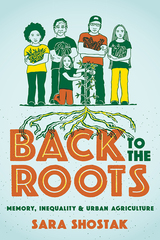
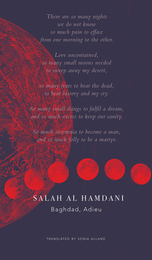
This landmark collection gathers thirty-five years of his writings, from his first volume in Arabic, Memory of Embers, to his latest collection, written originally in French, For You I Dream. It offers English-language readers their first substantial overview of Al Hamdani’s work, fired by the fight against injustice and shot through with longing for the home to which he can never return.
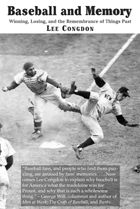
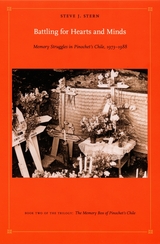
In the 1970s, Chilean dissidents were lonely “voices in the wilderness” insisting that state terror and its victims be recognized and remembered. By the 1980s, the dissent had spread, catalyzing a mass movement of individuals who revived public dialogue by taking to the streets, creating alternative media, and demanding democracy and human rights. Despite long odds and discouraging defeats, people of conscience—victims of the dictatorship, priests, youth, women, workers, and others—overcame fear and succeeded in creating truthful public memories of state atrocities. Recounting both their efforts and those of the regime’s supporters to win the battle for Chileans’ hearts and minds, Stern shows how profoundly the struggle to create memories, to tell history, matters.
Battling for Hearts and Minds is the second volume in the trilogy The Memory Box of Pinochet’s Chile. The third book will examine Chileans’ efforts to achieve democracy while reckoning with Pinochet’s legacy.
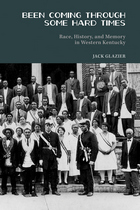
From the earliest days when slaves were brought to western Kentucky, the descendants of both slaves and slave owners in Hopkinsville, Kentucky, have continued to inhabit the same social and historic space. Part ethnography and part historical narrative, Been Coming through Some Hard Times offers a penetrating look at this southern town and the surrounding counties, delving particularly into the ways in which its inhabitants have remembered and publicly represented race relations in their community.
Neither Deep South nor Appalachian, this western Kentucky borderland presented unique opportunities for African American communities and also deep, lasting tensions with powerful whites. Glazier conducted fieldwork in Hopkinsville for some ten months, examining historical evidence, oral histories, and the racialized hierarchy found in the final resting places of black and white citizens. His analysis shows how structural inequality continues to prevail in Hopkinsville. The book’s ethnographic vignettes of worship services, school policy disputes, segregated cemeteries, a “dressing like our ancestors” day at an elementary school, and black family reunions poignantly illustrate the ongoing debate over the public control of memory. Ultimately, the book critiques the lethargy of white Americans who still fail to recognize the persistence of white privilege and therefore stunt the development of a truly multicultural society.
Glazier’s personal investment in this subject is clear. Been Coming through Some Hard Times began as an exploration of the life of James Bass, an African American who settled in Hopkinsville in 1890 and whose daughter, Idella Bass, cared for Glazier as a child. Her remarkable life profoundly influenced Glazier and led him to investigate her family’s roots in the town. This personal dimension makes Glazier’s ethnohistorical account especially nuanced and moving. Here is a uniquely revealing look at how the racial injustices of the past impinge quietly but insidiously upon the present in a distinctive, understudied region.
JACK GLAZIER is a professor of anthropology at Oberlin College. He is the author of Dispersing the Ghetto: The Relocation of Jewish Immigrants across America and Land and the Uses of Tradition among the Mbeere of Kenya.

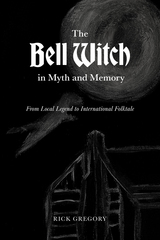
Apparently, slumber parties in the mid-South 1970s were plied with a strange ritual. At midnight attendees would gather before a mirror and chant “I don’t believe in the Bell Witch” three times to see if the legendary spook would appear alongside their own reflections—a practice that echoes the “Bloody Mary” pattern following the execution of Mary Queen of Scots centuries ago. But that small circuit of preteen gatherings was neither the beginning nor the end of the Bell Witch’s travels. Indeed, the legend of the haint who terrorized the Bell family of Adams, Tennessee, is one of the best-known pieces of folklore in American storytelling—featured around the globe in popular-culture references as varied as a 1930s radio skit and a 1980s song from a Danish heavy metal band. Legend has it that “Old Kate” was investigated even by the likes of future president Andrew Jackson, who was reported to have said, “I would rather fight the British ten times over than to ever face the Bell Witch again.”
While dozens of books and articles have thoroughly analyzed this intriguing tale, this book breaks new ground by exploring the oral traditions associated with the poltergeist and demonstrating her regional, national, and even international sweep. Author Rick Gregory details the ways the narrative mirrors other legends with similar themes and examines the modern proliferation of the story via contemporary digital media. The Bell Witch in Myth and Memory ultimately explores what people believe and why they believe what they cannot explicitly prove—and, more particularly, why for two hundred years so many have sworn by the reality of the Bell Witch. In this highly engaging study, Rick Gregory not only sheds light on Tennessee’s vibrant oral history tradition but also provides insight into the enduring, worldwide phenomenon that is folklore.
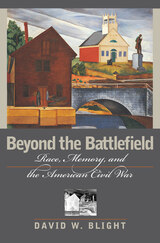
The book as a whole demonstrates several ways to probe the history of memory, to understand how and why groups of Americans have constructed versions of the past in the service of contemporary social needs. Topics range from the writing and thought of Frederick Douglass and W.E.B. Du Bois to a comparison of Abraham Lincoln and Douglass on the level of language and memory. The volume also includes a compelling study of the values of a single Union soldier, an analysis of Ken Burns's PBS series The Civil War, and a retrospective treatment of the distinguished African American historian Nathan I. Huggins.
Taken together, these lucidly written pieces offer a thoroughgoing assessment of the stakes of Civil War memory and their consequences for American race relations. Beyond the Battlefield demonstrates not only why we should preserve and study our Civil War battlefields, but also why we should lift our vision above those landscapes and ponder all the unfinished questions of healing and justice, of racial harmony and disharmony, that still bedevil our society and our historical imagination.
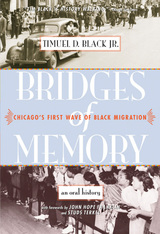
Recipient of 2007 The Hyde Park Historical Society Paul Cornell Award
A collection of interviews with African Americans who came to Chicago from the South. In their first great migration to Chicago that began during World War I, African Americans came from the South seeking a better life--and fleeing a Jim Crow system of racial prejudice, discrimination, and segregation. What they found was much less than what they'd hoped for, but it was much better than what they'd come from--and in the process they set in motion vast changes not only in Chicago but also in the whole fabric of American society. This book, the first of three volumes, revisits this momentous chapter in American history with those who lived it.
Oral history of the first order, Bridges of Memory lets us hear the voices of those who left social, political, and economic oppression for political freedom and opportunity such as they'd never known--and for new forms of prejudice and segregation. These children and grandchildren of ex-slaves found work in the stockyards and steel mills of Chicago, settled and started small businesses in the "Black Belt" on the South Side, and brought forth the jazz, blues, and gospel music that the city is now known for. Historian Timuel D. Black, Jr., himself the son of first-generation migrants to Chicago, interviews a wide cross-section of African Americans whose remarks and reflections touch on issues ranging from fascism to Jim Crow segregation to the origin of the blues. Their recollections comprise a vivid record of a neighborhood, a city, a society, and a people undergoing dramatic and unprecedented changes.
READERS
Browse our collection.
PUBLISHERS
See BiblioVault's publisher services.
STUDENT SERVICES
Files for college accessibility offices.
UChicago Accessibility Resources
home | accessibility | search | about | contact us
BiblioVault ® 2001 - 2024
The University of Chicago Press









